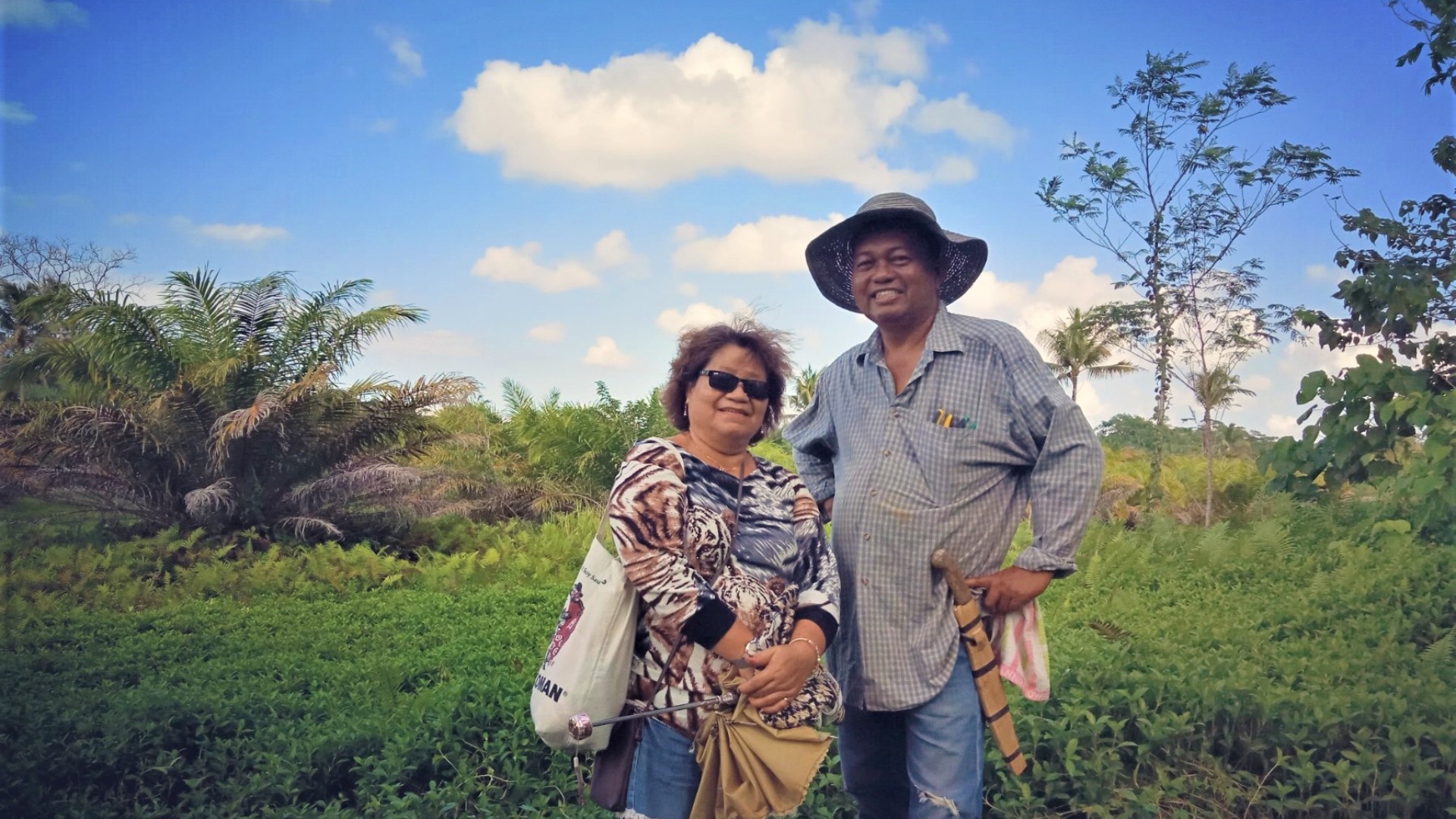Farming after retirement: Building the brand 'Once Tasted Always Wanted' products
By James Tababa

Dominga and Ricarte Ebare, owners of OTAW (Once Tasted Always Wanted) farm in Hinatuan, Surigao del Sur. (OTAW Farm)
After devoting their lives to raising a family, Ricarte and Dominga Ebare decided to establish a farm after retirement. Their ambition was to create a farm that prioritized organic and sustainable methods.
Ricarte is a licensed agricultural engineer and Dominga graduated with a degree in BS Agricultural Technology. After getting married, Dominga focused on homemaking and nurturing their garden while Ricarte worked in a private company. Their farming journey started in 2011 when they established OTAW (Once Tasted Always Wanted) farm in Hinatuan, Surigao del Sur that is planted to coconut, cacao, coffee, bamboo.
“Currently, since all our children have graduated and my husband has retired, we are now enjoying managing our farm,” Dominga said.
Farming products and practices
Dominga cultivates dwarf coconuts as the main crop, with the native tall variety also thriving there. Their farm has more than 400 coconut trees.
“The coconut is known as the "tree of life" because we can use every part of it, from the roots to the leaves,” Dominga said.
Their product lineup predominantly features coconut-based essentials like tuba, coconut vinegar, and virgin coconut oil (VCO). They've also introduced staples like traditional coconut cooking oil, coconut water vinegar, and frozen coconut milk as well as non-coconut items such as spicy vinegar and tablea from cacao.
Their commitment to innovation led them to participate in VCO and cocosugar processing, refining their skills through education at a Technical Education and Skills Development Authority (TESDA) -accredited farm school.
Their products are exclusively distributed through DTI Negosyo Centers and cooperative networks because the limited supplies are sold to primary customers in the nearby communities.
Dominga said they strongly support organic farming practices This is important as commercial fertilizers are costly compared to more affordable and sustainable organic methods.
“We hope that by the name of our farm, those who will taste our products will always want them,” Dominga said. “They will want them because they know that they are taking healthy products, that’s why we promote organic farming.”
They focus on using natural fertilizers like salt and seaweed, especially sargassum, for their coconut and fruit trees. Additionally, they've crafted homemade foliar fertilizers from molasses and sargassum, a type of seaweed with over 70 nutrients.
In addition, Dominga shared that the Philippine Coconut Authority (PCA) in CARAGA is scheduled to conduct a final evaluation of their farm, specifically in relation to coconut hybridization efforts. Should everything proceed as planned, OTAW Farm will be the sole hybridization practitioner in the area.
Pivoting during the pandemic
It was during the pandemic when Dominga started processing virgin coconut oil using the natural fermentation method. This method, known as cold pressing, avoids the use of heat entirely. Unlike heat-based methods that require costly machinery, cold pressing relies on natural fermentation alone. This choice is crucial for preserving the integrity of lauric acid, a key component of VCO that is sensitive to heat.
This approach has earned recognition from the CARAGA Department of Agriculture Agricultural Training Institute, which just recently named their farm as a Learning Site for Agriculture (LSA).
The local community initially found it hard to believe that oil could be extracted without the use of heat. However, as the health benefits of VCO gained recognition during the peak of the pandemic, their community supported them. This support boosted their motivation to produce VCO.
In order to expand the accessibility of their VCO, the Ebare couple applied for a License to Operate (LTO) from the Food and Drug Administration. This document authorizes establishments to engage in various business activities related to food products, including manufacturing, sale, distribution, and more. Obtaining this license was a significant step towards securing a certificate of product registration for their VCO.
Beyond being a plantita
“Some people would call me ‘plantita’ and I’m happy being called that way,” she said. “But being a farmer is more than just a ‘plantita’ because it entails skills in managing crops that can contribute value to the community.”
To Dominga, farming serves as a source of stress relief. She finds immense satisfaction in witnessing the growth of plants, a rewarding experience in itself.
Among the many fulfilling moments she cherishes, one stands out—the approval of their application for a Learning Site for Agriculture. While they await the official awarding of this document, Dominga envisions their farm becoming a hub for training programs, technology demonstrations, and various extension activities facilitated by the Agricultural Training Institute (ATI) under the Department of Agriculture (DA).
Challenges and struggles
As a small farmer in the Philippines, Dominga faces a range of challenges. These include the need for more substantial financial assistance from the government, as well as striving for stability in the prices of agricultural products, particularly copra.
Another noteworthy challenge is the approval process of the Food and Drug Administration (FDA). During an audit conducted by the FDA, they outlined a set of requirements to be met. However, due to limited resources, fulfilling these requirements remains a challenge. Despite this setback, Dominga remains hopeful that they will be able to address these compliance issues immediately.
A vision for community development
Dominga takes special pride in OTAW Farm's recognition as an LSA. This achievement marks a significant milestone, positioning their farm as a hub for training, visits, and hands-on learning experiences. Dominga is excited to share several upcoming initiatives aimed at enhancing their farm's offerings. The farm is in the process of launching initiatives such as buko pie production using coconut-based ingredients, balut making, crafting amakan (woven bamboo strips) bamboo products, and engaging in coconut hybridization.